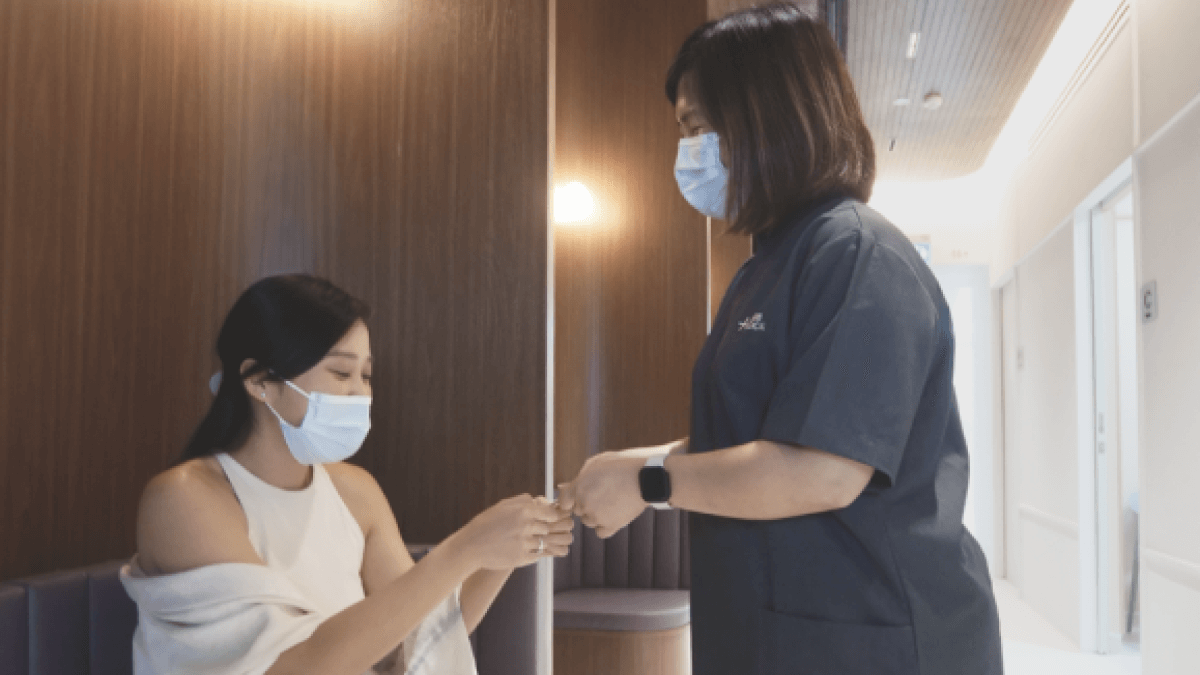Female Fertility Tests Singapore

Hormones, AMH & More - Take Control of Your Fertility Journey
Whether you're actively trying to conceive or planning ahead, understanding your fertility profile is one of the most empowering steps you can take.
At Regis Medical, we offer a comprehensive range of female fertility tests to help you make informed decisions about your reproductive health.
What Does a Female Fertility Test Check?
Our female fertility screening typically includes:
1. Hormone Panel
- Blood test done on Day 2–5 of your menstrual cycle to check:
- FSH (Follicle-Stimulating Hormone) – Stimulates follicle growth
- LH (Luteinising Hormone) – Triggers ovulation
- Estradiol (E2) – Estrogen hormone for cycle regulation
- Progesterone – Confirms ovulation (measured ~Day 21)
- Prolactin – High levels can interfere with ovulation
- Testosterone – May be elevated in PCOS
- TSH (Thyroid Stimulating Hormone) – Affects ovulation and cycle regularity
2. Anti-Müllerian Hormone (AMH)
- Measures ovarian reserve (how many eggs you likely have left)
- Evaluate response to fertility treatments (like IVF)
- Help diagnose conditions like PCOS or primary ovarian insufficiency
Can be done any day of your cycle. Useful even if you're not trying to conceive yet
3. Pelvic Ultrasound (Transvaginal)
- Checks for ovarian cysts, uterine fibroids, or structural abnormalities
- Can detect polycystic ovaries (a sign of PCOS)
4. Thalassaemia Screening
- Important if you or your partner are carriers
- Genetic blood disorder that may affect offspring
5. Vitamin & Micronutrient Deficiency Screen
- Key fertility-related nutrients: Vitamin D, B12, Folate, Iron, Zinc
- Deficiencies can affect ovulation, implantation, and egg quality
6. Other Optional Investigations
- STD & infection screening (e.g. Chlamydia, which can affect fallopian tubes)
- Insulin or glucose testing (for PCOS or metabolic concerns)
Who Should Get Tested?
You may benefit from fertility testing if you:
- Have been trying to conceive for 6–12 months without success
- Have irregular or absent periods
- Are over 35 and planning pregnancy
- Have a known condition like PCOS or endometriosis
- Want to proactively check your fertility status
How to Prepare for Your Tests
- Track your cycle: Some tests need to be done on specific days (e.g. Day 2–5 of your period).
- No fasting needed for most hormone or AMH tests. Unless you are taking insulin or glucose tests
- Check your medications: Let our doctor know if you’re on hormones or birth control.
We’ll send you detailed prep instructions beforehand.
Why Female Fertility Tests matters
Understanding your fertility health is an important step, whether you’re planning for pregnancy now, in the future, or simply want clarity on your reproductive health.
Fertility is influenced by many factors, including hormones, ovarian reserve, lifestyle, and age. Testing provides valuable insight into:
- How your reproductive hormones are functioning (e.g. FSH, LH, Estradiol, Progesterone)
- Whether you are ovulating regularly
- Your ovarian reserve (measured by Anti-Müllerian Hormone or AMH)
- Possible underlying conditions like PCOS or thyroid disorders
- Your overall readiness for conception, especially if you're trying unsuccessfully
Even if you’re not actively trying to conceive, fertility tests can help you make informed decisions about family planning, egg freezing, or lifestyle changes to support long-term reproductive health.
At our clinic, we offer private, judgment-free consultations and personalised advice based on your results.
What to Expect at Your Appointment
- Doctor consult: Review your health, history, and concerns
- Semen collection: Done offsite at our partner labs (we'll advise)
- Blood test: For hormone levels, thalassaemia, vitamins
- Follow-up review: Doctor explains your results & next steps
What Happens After Your Tests?
Our doctor will review your results with you and may:
- Identify the root cause of fertility issues
- Recommend lifestyle changes, supplements, or medications
- Refer you to a fertility specialist or gynaecologist if needed
- Suggest assisted reproductive options if necessary (IUI, IVF)
Female Fertility Tests
Test
Anti-Müllerian Hormone (AMH)
Full female hormonal panel – (FSH, LH, Estradiol, Prolactin, Free T4, DHEAS, Cortisol, Progesterone)
Pelvis Ultrasound (Transvaginal)*
Complete Thalassaemia Profile (FBC, HbE, Ferritin, PBF)
Vitamin & Mineral Deficiency Test (Vitamin D, B12, Folate, Iron, Magnesium)
*Done at partner labs and centres
Whatsapp Us Make an Appointment
*Prices listed were last updated on 1 July 2023. Prices may be subject to change.
*Price does not include consultation fee and GST.
*Female Doctors available on request.
Why Choose Regis Medical

Book Your Fertility Test Today
Whether you're planning ahead or actively trying to conceive, fertility testing can give you clarity and control.

Finding Us
Holland Village
255 Holland Ave, Singapore 278983
Near MRT Exit B
Mon, Tues, Thurs, Fri:
8.30am - 2.30pm
5.30pm - 10.00pm
Wed:
8.30am - 2.30pm
Sat:
9.00am - 3.00pm
Closed on Sundays and Public Holidays. For the latest updates on our clinic’s opening hours, please check our Google Maps.
** GP registration ends 15 mins before the closing time above, while Physiotherapy & Acupuncture end registration 45 mins before. Please book an appointment in advance to avoid queues and disappointment.
Katong
437 Joo Chiat Road, Singapore 427650
Near Marine Parade MRT
Mon, Tues, Thurs, Fri:
8.30am - 2.30pm
5.30pm - 10.00pm
Wed:
8.30am - 2.30pm
Sat:
9.00am - 3.00pm
Closed on Sundays and Public Holidays. For the latest updates on our clinic’s opening hours, please check our Google Maps.
** GP registration ends 15 mins before the closing time above, while Physiotherapy & Acupuncture end registration 45 mins before. Please book an appointment in advance to avoid queues and disappointment.
FAQ
Accessibility & Support
Regis Medical Holland Village is located at 255 Holland Avenue, Singapore 278983
Regis Medical Katong is located at 437 Joo Chiat Road, Singapore 427650
Click here to view our opening hoursAppointment
To book an appointment at Regis Medical Holland Village, please call or whatsapp us 8118 5298
To book an appointment at Regis Medical Katong, please call or whatsapp us 9851 3728
You can only cancel or change your appointments up to 24 hours before your appointment. You will receive your refund within 3 working days. No refund will be issued for no shows and cancellations within 24 hours before your appointment. However, if you are feeling unwell on the day of the appointment, we allow patients who have their acute illness seen at Regis Medical to reschedule their appointment without extra cost.
This policy is subject to change.
Yes. You can reschedule your appointments. However, you need to reschedule your appointment at least 24 hours before your actual appointment time. If you are unwell on the day of the appointment, we will reschedule your appointment at no extra cost if you seek medical attention at our clinic (for non-emergencies only).
Finance
General
- FSH, LH, Estradiol (day 2–3 of cycle)
- Anti-Müllerian Hormone (AMH) – measures egg reserve
- TSH, Prolactin – thyroid and pituitary function
- Checks ovaries, follicles, and uterus structure
- LH surge testing or progesterone (day 21)
- To check for blocked fallopian tubes or uterine abnormalities
- Day 2–3 of your period: for baseline hormones (FSH, LH, Estradiol)
- Day 21 (or 7 days before expected period): for progesterone (ovulation confirmation)
- AMH and thyroid tests: can be done any time in the cycle
- Low ovarian reserve (low AMH, high FSH)
- PCOS (high LH/androgens, irregular ovulation)
- Thyroid issues (high or low TSH)
- Ovulation issues (low mid-luteal progesterone)
- Lifestyle changes
- Ovulation support
- Referral to a fertility specialist or gynaecologist
- Egg freezing or IVF if appropriate